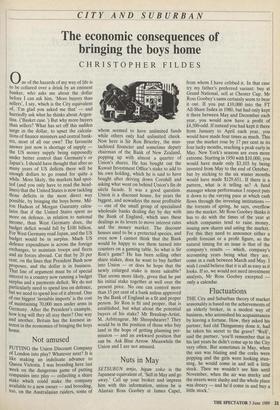CITY AND SUBURBAN
The economic consequences of bringing the boys home
CHRISTOPHER FILDES
0 ne of the hazards of my way of life is to be collared over a drink by an eminent banker, who asks me about the dollar before I can ask him. 'More buyers than sellers', I say, which is the City equivalent of, 'I'm glad you asked me that' — and hurriedly ask what he thinks about Argen- tina. (`Basket case.') But why more buyers than sellers? What has set off this sudden surge in the dollar, to upset the calcula- tions of finance ministers and central bank- ers, most of all our own? The favourite answer just now is shortage of supply the US money supply being supposedly under better control than Germany's or Japan's. I should have thought that after so many years of US deficits there will be enough dollars to go round for quite a while. More likely, the markets had spot- ted (and you only have to read the head- lines) that the United States is now tackling those deficits in the most direct way possible, by bringing the boys home. Mil- ton Hudson of Morgan Guaranty calcu- lates that if the United States spent no more on defence, in relation to national income, than West Germany does, the budget deficit would fall by $100 billion. For West Germany read Japan, and the US budget would be in surplus. Much US defence expenditure is across the foreign exchanges, to maintain troops and fleets and air forces abroad. Cut that by 20 per cent, on the lines that President Bush now proposes, and the dollar is in business. That line of argument must be of special interest to a country now running a budget surplus and a payments deficit. We do not particularly need to spend less on defence, but we need to spend less of it abroad. One of our biggest 'invisible imports' is the cost of maintaining 70,000 men under arms in Germany. After the President's example, how long will they all stay there? One way and another, Britain has the keenest in- terest in the economics of bringing the boys home.


















































 Previous page
Previous page